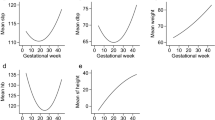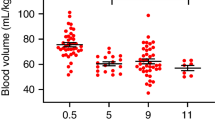Abstract
Summary: Uterine blood flow and its distribution to uterus, placenta and subplacental structures was measured in 18 pregnant guinea pigs studied under chronic steady-state conditions. Maternal cardiac output averaged 266 ± 14 ml/min. Placenta) blood flow (PBF) remained less than 4 ml/min until 50 days gestation, after which it increased rapidly, attaining flows of 16 ml/min at term. PBF also increased linearly with placental weight (r = 0.76, P < 0.001); however, the increase in PBF with gestational age is evident even in narrow weight ranges, indicating hyperperfusion of term placentas relative to those earlier in gestation. Fetal weight correlated with measured placental blood flow supplying the corresponding placenta after 50 days gestation (r = 0.72, P < 0.001).
Speculation: Placental blood flow appears to be an important independent determinant of spontaneous fetal size. Measurement of uteroplacental blood flow under unstressed conditions accurately describes normal uteroplacental blood flow and may provide more reliable characterizations of the relationships between uteroplacental blood flow, placental size, and fetal growth.
Similar content being viewed by others
Log in or create a free account to read this content
Gain free access to this article, as well as selected content from this journal and more on nature.com
or
Author information
Authors and Affiliations
Rights and permissions
About this article
Cite this article
Peeters, L., Sparks, J., Grutters, G. et al. Uteroplacental Blood Flow during Pregnancy in Chronically Catheterized Guinea Pigs. Pediatr Res 16, 716–720 (1982). https://doi.org/10.1203/00006450-198209000-00003
Issue date:
DOI: https://doi.org/10.1203/00006450-198209000-00003
This article is cited by
-
Blocking Endogenous Leukemia Inhibitory Factor During Placental Development in Mice Leads to Abnormal Placentation and Pregnancy Loss
Scientific Reports (2015)
-
Dihydroergotamine causes fetal growth retardation in guinea pigs
Archives of Gynecology and Obstetrics (1992)



